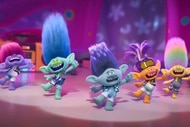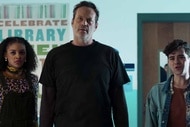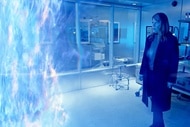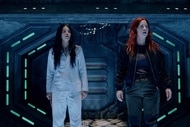Create a free profile to get unlimited access to exclusive videos, sweepstakes, and more!
6 wild fan theories you didn't realize were fan theories
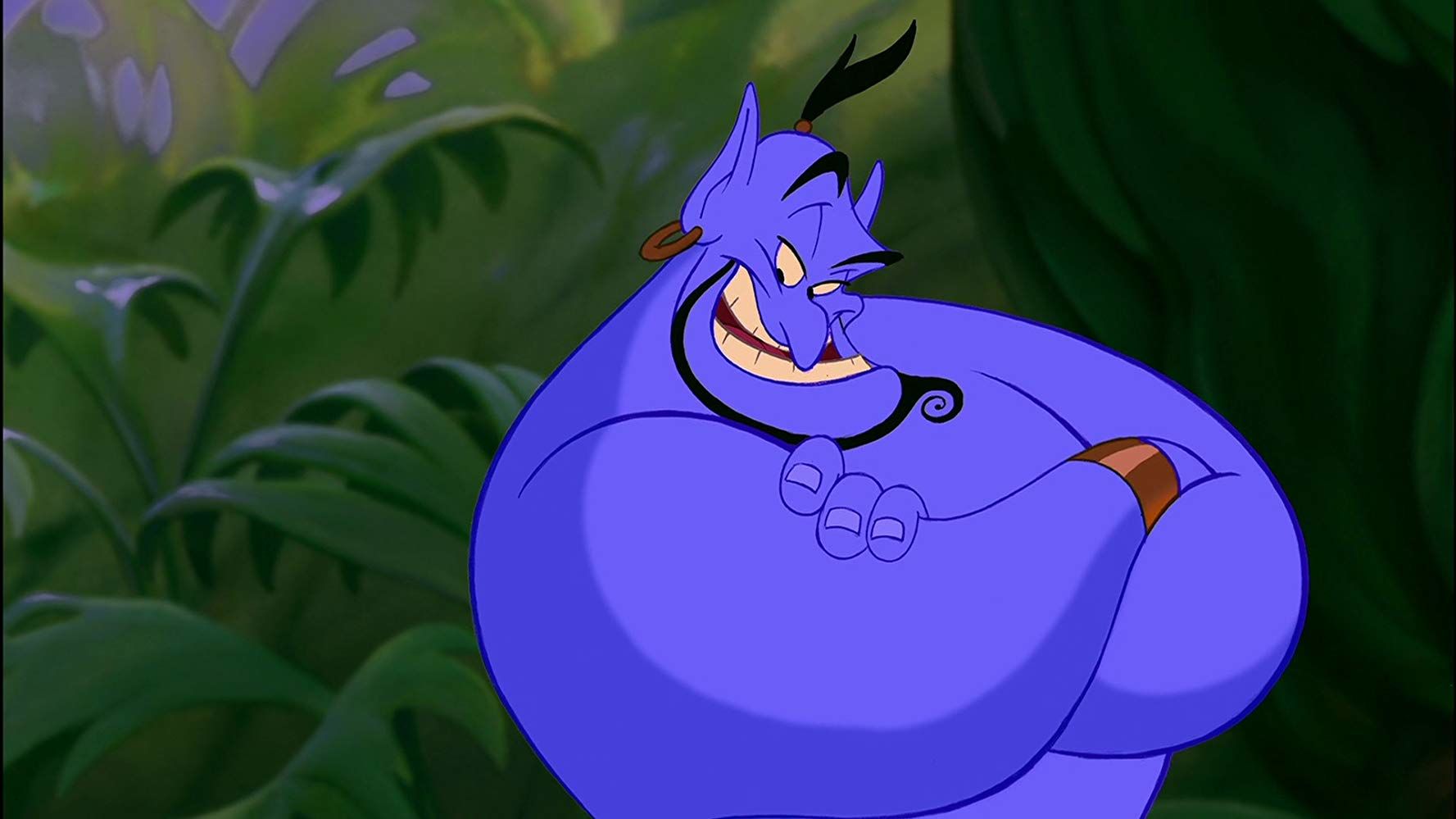
The fan theory. Has there ever been a more powerful artifact about how much we love movies than coming up with and sharing connections from plot developments the writer and/or director of the movie themselves didn't realize — or did they?
We've seen it come full circle in the last few years. Consider Rogue One: A Star Wars Story. Based on a single, almost throwaway, line in Star Wars: Episode IV – A New Hope when Vader tells Leia he knows about the data transmitted to the Tantive IV, Rogue One was the ultimate fan theory about how that transpired.
But fan theories go deeper and are based on even more tenuous connections. Here are some of the best.
01. Planet of the Genies — Aladdin (1992)
One of the genie's many priceless lines delivered by the immortal comic genius of Robin Williams is when he turns into a fashion designer, jokingly berating Aladdin's fez and vest combo as being "much too third century."
But what does he say when he's first released from the lamp? "Ten thousand years will give you such a crick in the neck!" If he knows what fashions were like in the third century (to say nothing of doing convincing impressions of Jack Nicholson and Jake LaMotta), the story must be set sometime after 10,300 AD.
Owing to the primitive technology of the Aladdin universe, did the rest of the world destroy itself eons before, leaving Arabia to rise again through anthropological primitivism and socioeconomic feudalism?
02. Bond, bound — The Rock (1996)
He calls himself John Mason, but the then 60-something Scot has been locked up without due process and with the key thrown away when we meet him in Michael Bay's smash-em-up, persona non grata in the U.S. and Britain as FBI director Womack (John Spencer) explains.
Buying into another popular theory that James Bond isn't a name but a codename bestowed on a succession of suave British spies with licenses to kill, what if Mason is actually the Bond we know from Thunderball, Dr. No, etc., caught in America for spying years before and thrown into the darkest hole the US government has after he escaped from Alcatraz?
03. Over the rainbow — Inception (2010)
Among the rules of shared dream logic, the most low key is the totem — the piece of personal iconography that represents proof you're really awake.
But it's the basis for a fan theory that might change the whole plot. Even though Cobb (Leonardo DiCaprio) explains to Ariadne (Ellen Page) that the spinning top is his totem, might it actually be his wedding ring? Eagle-eyed fans have noticed that he only wears it in the various dream realms, never the "real" world.
Instead of wife Mal (Marion Cottilard) dying by throwing herself out of a hotel room window (it never explains why she seems to be in another building across the street, by the way) she might be leaving the dream Cobb doesn't realize they're trapped in.
The film ends with what he thinks is his totem of the spinning top wobbling and righting itself on the table as the picture goes black. Reunited with his kids, it seems Cobb no longer cares whether the world around him is even real.
04. The one that became nothing — Kill Bill Vol. 1 (2003)
Along with Red Apple cigarettes and the Vega brothers, Tarantino movies have always contained shared universe links. What if Kill Bill is a movie within a movie?
Mia (Uma Thurman) tells Vincent (John Travolta) about the TV pilot Fox Force Five she was in during their "date" in Pulp Fiction, a show about a squad of female badasses who kill people using skills from samurai swords to bad puns.
What else was she describing but Kill Bill, which contained the Deadly Viper Assassination Squad that turned on The Bride (Thurman again)? Did Tarantino love the idea of Fox Force Five so much he went and made the (extended) pilot?
05. The everlasting gobstopper is people! — Willy Wonka and the Chocolate Factory (1971)
The Wonka Chocolate factory is a living a fable about the various fates that befall misbehaving children based loosely on the Seven Deadly Sins, but you never really question what becomes of Augustus, Veruca, etc after the Oompa Loompas carry them off to deal with their gluttony or greed. Wonka (Gene Wilder) assures Charlie (Pete Ostrum) that the other kids are fine near the end, but why should we believe him?
What if he runs his globe-stopping competitions to allow a select group of kids into the Xanadu-like factory because he needs new ingredients? The kids are variously drowned, blown up, ground up, disintegrated or crushed — what if they end up in the candy, Soylent corporation-style?
The creepiest hint is on the nightmarish boat ride out of the chocolate river room when every seat is occupied. What else can it mean except that Wonka knew Augustus (Michael Bollner) and his mother wouldn't be continuing on the tour?
06. Ferris is Cameron's Tyler Durden — Ferris Beuller's Day Off (1986)
Ferris Bueller is everything Cameron Fry isn't – confident, impulsive and fun. While Cameron is neglected by distant, domineering parents, Ferris has perfect parents, is loved by all the school cliques and has the beautiful Sloan Peterson on his arm.
Ferris drags Cameron along on the adventure Cameron himself wishes he was brave enough to execute – sightseeing, talking his way into a fancy restaurant, constantly one-upping their slimy principal Rooney and getting the whole of Chicago to fall in line and sing with him.
According to this theory, Cameron (convinced he's sick and aided by the array of cold and flu drugs by his bedside) conjures Ferris up as the disembodied id he wishes he had.
The clues are everywhere. Ferris breaks the fourth wall constantly, making imagination and fantasy cornerstones of the movie. When Cameron tells himself he's dying his friend immediately calls to tell him he's not. It's Ferris who challenges Cameron to stand up to his terrifying father, which he does by stealing the beloved Ferarri ("I could have stopped you," Cameron says later with a newly developed agency), and then gleefully destroying it. Ferris even makes it literal, telling Cameron prophetically when he calls "that's all in your head."
07. Comrade Ryanevski Stoneislavski — Gravity (2013)
The only thing we ever hear about mission specialist Ryan Stone's (Sandra Bullock) project on board the space shuttle Explorer is that it's a "prototype." Her commander, Mike Kowalski (George Clooney), says that they don't bankroll prototypes, but before we learn anything more, the storm of debris from satellite collision is on its way.
Mission control (Ed Harris) tells the crew Russia has destroyed one of its own orbiters, causing a chain reaction of destruction. Why? The easiest way to dispose of decommissioned satellites is to steer them into an orbit that will cause them to burn up on re-entry or drop into the ocean where explosive secrets can be retrieved.
Either NASA does bankroll prototypes (and wouldn't mission commander Kowalski know what's being done on his flight?) or Stone is a Kremlin plant in the astronaut program. She initially can't get her project working — did her overlords decide it was worth the cost to destroy both it and her to keep it secret, carefully aiming a cascading mass of orbiting debris at the Explorer?
Or is she CIA, put in space to destroy something that might give Russia a military advantage, her 'prototype' really a weapon that took out the Russian satellite? Did Stone have a plan to escape before the debris hit, one she ran out of time to enact? Or did she never intend to leave, ready to sacrifice her life for the cause?



